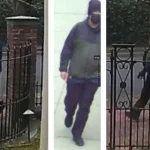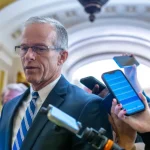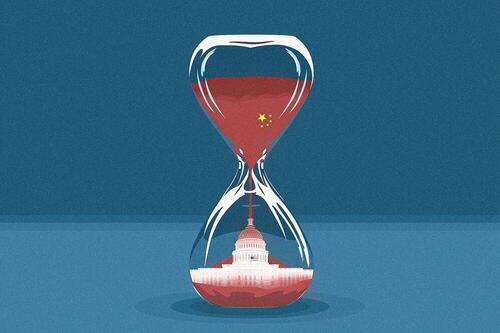
Authored by Eva Fu via The Epoch Times (emphasis ours),
As Chinese authorities escorted the senior Federal Reserve official from his Shanghai hotel room, they demanded he “say good things about China" when back in the United States.

The atmosphere was “frightening,” the official, who remained unnamed, recalled to the Fed.
That was the first of four times the official was detained and interrogated during a 2019 trip to Shanghai. Chinese authorities threatened his family, tapped his phones and computers, and copied contact information of other Federal Reserve officials from his account on Chinese social media app WeChat, according to Senate Homeland Security Committee Republicans who made public the details in a report last July.
The U.S. official recounted Chinese authorities trying to pry “sensitive, non-public economic data” out of him and insisting that he “advise senior government officials” on sensitive economic issues such as trade tariffs while the United States and China were embroiled in a trade war. They forced him to drink liquor and attempted to make him commit to future meetings to allow them to gather economic intelligence.
Unsettling as it is, the incident was but part of a “long-running and brazen” malicious campaign from China over the course of more than a decade to undermine U.S. economic policy and advance Beijing’s ambition to supplant the United States as the global superpower.
Coercion and threats represent only a sliver of the regime’s toolbox used to target the Western political sphere. A Chinese think tank based in Beijing, in partnering with the state-affiliated Tsinghua University, in 2019 rated White House advisors and U.S. governors by their friendliness to Beijing. The group labeled officials as “friendly,” “ambiguous,” or “hardline” after combing through metrics such as age, work history, public statements, trade activities with China, and length of term.
Time, patience, and thoroughness—these are attributes that Michel Juneau-Katsuya, former Asia Pacific chief at the Canadian Security Intelligence Service in the 1990s, sees in the Chinese regime’s craft of infiltration.
“They've been capable to work in a very holistic way,” he told The Epoch Times.
China, he noted, doesn’t have a democratic election process that could displace the leadership from power. “So they know that they can plant today something that will be capable to be harvested in five, 10 or 15 years.”
Sen. Mike Braun (R-Ind.), who has advocated for a tougher stance on China, agreed.
“They're playing the long game,” he told The Epoch Times.
Biding Their Time
Few if any U.S. leaders, from the federal, state, local, tribal, and territorial levels, are immune to the risk of the Chinese regime manipulating them to bolster its hidden agenda, warned the National Counterintelligence and Security Center in July last year.
By leveraging relationships with U.S. officials—called “using the local to surround the central” in communist slogan terms—Beijing can pressure Washington to back policy outcomes favorable to the regime, such as deepening bilateral economic ties and tamping down criticism of the regime’s abysmal human rights record.
A Chinese spy reportedly drove for the recently deceased Sen. Dianne Feinstein (D-Calif.) for 20 years.
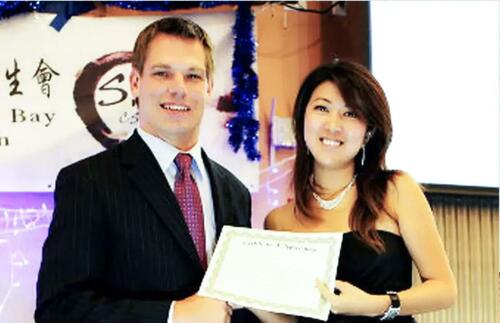
Christine Fang, an alleged Chinese spy working for China’s top intelligence agency, the Ministry of State Security, reportedly used campaign fundraising, networking, and romantic relationships with at least two Midwestern city mayors to gain a footing in their spheres of influence.
Ms. Fang also approached Rep. Eric Swalwell (D-Calif.) when he was a member of the Dublin City Council, raised money for his 2014 reelection campaign, and facilitated an intern’s placement in Mr. Swalwell’s office, according to Axios.
The connection prompted a two-year investigation from the bipartisan House Ethics Committee, which in May ultimately decided not to take any action against the California lawmaker, but cautioned Mr. Swalwell to remain aware of “the possibility that foreign governments may attempt to secure improper influence through gifts and other interactions.”
The United Front network, which helps the Party control the Chinese diaspora, also plays a role in co-opting well-placed individuals for Beijing’s interests.
Lu Jianwang, one of the two alleged operators of a secret Chinese police station in New York, together with his brother, has given tens of thousands of dollars to New York politicians in recent years, including vice chair of the Democratic National Committee Rep. Grace Meng (D-N.Y.), New York Mayor Eric Adams, and New York Gov. Kathy Hochul, campaign finance records show.
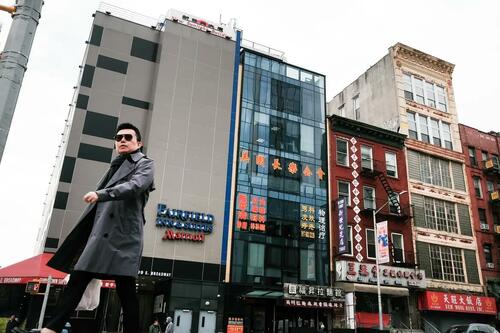
“Local level officials, state officials are just not going to be as aware of or as attuned to some of these influence efforts—they're just trying to create jobs,” Sarah Cook, a senior China analyst at the Freedom House, told The Epoch Times.
“The CCP is very good at taking advantage of that, to get people to side with them, to get people in the United States to have a stake in what the CCP also wants. Then later, that can be activated to create situations that are more problematic.”
“I think people at the earliest part of that relationship, don't realize that,” she added.
As with Ms. Fang’s case, the Chinese influence operations begin early in the local leaders’ careers.
“They're very, very patient, they have time on their side. Their determination and their focus is remarkable,” Mr. Juneau-Katsuya said of the regime.
He said that Chinese intelligence officers-turned-defectors had detailed to him how they were instructed to be model citizens in the Western world for five to 10 years, working their way up the ladder in society before being “activated.”
“When the security service or the police tried to do a background check, they find absolutely nothing,” he said. “So they are extremely, extremely deep undercover agents in that perspective," Mr. Juneau-Katsuya said.
‘Lie in Plain Sight’
Taiwan, Uyghur, Falun Gong, Tiananmen Square. The list of the Chinese Communist Party’s trigger words goes on. And the regime has made it clear that no one—in China or anywhere else—should go against its will.
Late at night on March 28, a day after the House overwhelmingly passed Rep. Chris Smith’s (R-N.J.) Stop Forced Organ Harvesting Act of 2023, a furious email from the Chinese embassy’s minister counselor Zhou Zheng arrived at the inbox of an aide to the congressman.
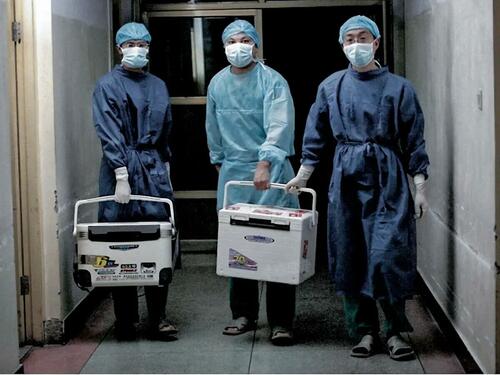
The email, written from a Gmail account registered under Mr. Zhou, declared the bill “absurd” and claimed the “so-called ‘forced organ harvesting’ in China is a farce.”
The bill was the first ever such legislative piece to curb the state-sanctioned killing of prisoners of conscience for their organs, an atrocity that an independent London tribunal in 2019 concluded has taken place in China for years “on a significant scale.”
A number of whistleblowers, including eyewitnesses, have come forward to The Epoch Times to share testimony of the grisly act.
Mr. Zhou, in true Beijing fashion, demanded that the United States stop "baseless hype and anti-China moves and stops preceding [sic] this legislation.”
Mr. Smith said the claims in the email were "a big lie in plain sight."
“The Falun Gong practitioners and the Uyghurs are being killed for their organs, and it's tens of thousands every single year, as we know,” he told The Epoch Times.
“Perfectly healthy people being put down in a gurney drugged in order to effectuate two to three of their organs being taken out involuntarily—and they kill them—that is murder. That's crimes against humanity.”
The New Jersey Republican on April 14 wrote to the Chinese embassy requesting a visa to visit Xinjiang, the northwestern Chinese region where an estimated 1 million Uyghurs are being held in detention camps. He hasn’t heard back.
A few weeks before the email to Mr. Smith, counselor Li Xiang with the Chinese embassy wrote to Sen. Josh Hawley (R-Mo.), insisting he retract his bill ordering the declassification of information surrounding COVID-19 origins, which had been signed into law on March 20.
Mr. Hawley shrugged it off. “The Chinese government wrote to me and demanded I withdraw my Covid origins bill,” he wrote in a social media post on March 9. “Hahaha. Not a chance.”
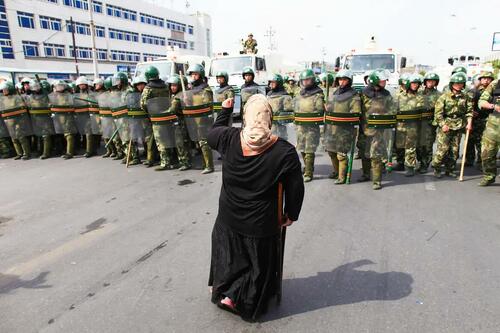
Mr. Li also hit a wall when he tried to block a scheduled congressional hearing on the origins of COVID-19. Nor was he successful with his warning to House lawmakers not to meet with Taiwan’s President Tsai Ing-wen during her visit to Los Angeles.
The audacity of the regime in making demands of an elected member of Congress “incensed” Rep. Ashley Hinson (R-Iowa), one of the recipients of the threatening letter.
“Basically, I just said, ‘No, you can't tell me who I can and can't meet with and I'm going to go ahead and meet with her,’" Ms. Hinson told The Epoch Times. "And that's what we did."
"The fact that somebody was bold enough to assume that they could send me an email like that, and threaten and bully me—incredulous.”
“I will not be bullied, my mind is not going to be changed on an email like that, where you are deliberately trying to undermine my ability to do my job.”
Read more here...
Authored by Eva Fu via The Epoch Times (emphasis ours),
As Chinese authorities escorted the senior Federal Reserve official from his Shanghai hotel room, they demanded he “say good things about China” when back in the United States.

The atmosphere was “frightening,” the official, who remained unnamed, recalled to the Fed.
That was the first of four times the official was detained and interrogated during a 2019 trip to Shanghai. Chinese authorities threatened his family, tapped his phones and computers, and copied contact information of other Federal Reserve officials from his account on Chinese social media app WeChat, according to Senate Homeland Security Committee Republicans who made public the details in a report last July.
The U.S. official recounted Chinese authorities trying to pry “sensitive, non-public economic data” out of him and insisting that he “advise senior government officials” on sensitive economic issues such as trade tariffs while the United States and China were embroiled in a trade war. They forced him to drink liquor and attempted to make him commit to future meetings to allow them to gather economic intelligence.
Unsettling as it is, the incident was but part of a “long-running and brazen” malicious campaign from China over the course of more than a decade to undermine U.S. economic policy and advance Beijing’s ambition to supplant the United States as the global superpower.
Coercion and threats represent only a sliver of the regime’s toolbox used to target the Western political sphere. A Chinese think tank based in Beijing, in partnering with the state-affiliated Tsinghua University, in 2019 rated White House advisors and U.S. governors by their friendliness to Beijing. The group labeled officials as “friendly,” “ambiguous,” or “hardline” after combing through metrics such as age, work history, public statements, trade activities with China, and length of term.
Time, patience, and thoroughness—these are attributes that Michel Juneau-Katsuya, former Asia Pacific chief at the Canadian Security Intelligence Service in the 1990s, sees in the Chinese regime’s craft of infiltration.
“They’ve been capable to work in a very holistic way,” he told The Epoch Times.
China, he noted, doesn’t have a democratic election process that could displace the leadership from power. “So they know that they can plant today something that will be capable to be harvested in five, 10 or 15 years.”
Sen. Mike Braun (R-Ind.), who has advocated for a tougher stance on China, agreed.
“They’re playing the long game,” he told The Epoch Times.
Biding Their Time
Few if any U.S. leaders, from the federal, state, local, tribal, and territorial levels, are immune to the risk of the Chinese regime manipulating them to bolster its hidden agenda, warned the National Counterintelligence and Security Center in July last year.
By leveraging relationships with U.S. officials—called “using the local to surround the central” in communist slogan terms—Beijing can pressure Washington to back policy outcomes favorable to the regime, such as deepening bilateral economic ties and tamping down criticism of the regime’s abysmal human rights record.
A Chinese spy reportedly drove for the recently deceased Sen. Dianne Feinstein (D-Calif.) for 20 years.

Christine Fang, an alleged Chinese spy working for China’s top intelligence agency, the Ministry of State Security, reportedly used campaign fundraising, networking, and romantic relationships with at least two Midwestern city mayors to gain a footing in their spheres of influence.
Ms. Fang also approached Rep. Eric Swalwell (D-Calif.) when he was a member of the Dublin City Council, raised money for his 2014 reelection campaign, and facilitated an intern’s placement in Mr. Swalwell’s office, according to Axios.
The connection prompted a two-year investigation from the bipartisan House Ethics Committee, which in May ultimately decided not to take any action against the California lawmaker, but cautioned Mr. Swalwell to remain aware of “the possibility that foreign governments may attempt to secure improper influence through gifts and other interactions.”
The United Front network, which helps the Party control the Chinese diaspora, also plays a role in co-opting well-placed individuals for Beijing’s interests.
Lu Jianwang, one of the two alleged operators of a secret Chinese police station in New York, together with his brother, has given tens of thousands of dollars to New York politicians in recent years, including vice chair of the Democratic National Committee Rep. Grace Meng (D-N.Y.), New York Mayor Eric Adams, and New York Gov. Kathy Hochul, campaign finance records show.

“Local level officials, state officials are just not going to be as aware of or as attuned to some of these influence efforts—they’re just trying to create jobs,” Sarah Cook, a senior China analyst at the Freedom House, told The Epoch Times.
“The CCP is very good at taking advantage of that, to get people to side with them, to get people in the United States to have a stake in what the CCP also wants. Then later, that can be activated to create situations that are more problematic.”
“I think people at the earliest part of that relationship, don’t realize that,” she added.
As with Ms. Fang’s case, the Chinese influence operations begin early in the local leaders’ careers.
“They’re very, very patient, they have time on their side. Their determination and their focus is remarkable,” Mr. Juneau-Katsuya said of the regime.
He said that Chinese intelligence officers-turned-defectors had detailed to him how they were instructed to be model citizens in the Western world for five to 10 years, working their way up the ladder in society before being “activated.”
“When the security service or the police tried to do a background check, they find absolutely nothing,” he said. “So they are extremely, extremely deep undercover agents in that perspective,” Mr. Juneau-Katsuya said.
‘Lie in Plain Sight’
Taiwan, Uyghur, Falun Gong, Tiananmen Square. The list of the Chinese Communist Party’s trigger words goes on. And the regime has made it clear that no one—in China or anywhere else—should go against its will.
Late at night on March 28, a day after the House overwhelmingly passed Rep. Chris Smith’s (R-N.J.) Stop Forced Organ Harvesting Act of 2023, a furious email from the Chinese embassy’s minister counselor Zhou Zheng arrived at the inbox of an aide to the congressman.

The email, written from a Gmail account registered under Mr. Zhou, declared the bill “absurd” and claimed the “so-called ‘forced organ harvesting’ in China is a farce.”
The bill was the first ever such legislative piece to curb the state-sanctioned killing of prisoners of conscience for their organs, an atrocity that an independent London tribunal in 2019 concluded has taken place in China for years “on a significant scale.”
A number of whistleblowers, including eyewitnesses, have come forward to The Epoch Times to share testimony of the grisly act.
Mr. Zhou, in true Beijing fashion, demanded that the United States stop “baseless hype and anti-China moves and stops preceding [sic] this legislation.”
Mr. Smith said the claims in the email were “a big lie in plain sight.”
“The Falun Gong practitioners and the Uyghurs are being killed for their organs, and it’s tens of thousands every single year, as we know,” he told The Epoch Times.
“Perfectly healthy people being put down in a gurney drugged in order to effectuate two to three of their organs being taken out involuntarily—and they kill them—that is murder. That’s crimes against humanity.”
The New Jersey Republican on April 14 wrote to the Chinese embassy requesting a visa to visit Xinjiang, the northwestern Chinese region where an estimated 1 million Uyghurs are being held in detention camps. He hasn’t heard back.
A few weeks before the email to Mr. Smith, counselor Li Xiang with the Chinese embassy wrote to Sen. Josh Hawley (R-Mo.), insisting he retract his bill ordering the declassification of information surrounding COVID-19 origins, which had been signed into law on March 20.
Mr. Hawley shrugged it off. “The Chinese government wrote to me and demanded I withdraw my Covid origins bill,” he wrote in a social media post on March 9. “Hahaha. Not a chance.”

Mr. Li also hit a wall when he tried to block a scheduled congressional hearing on the origins of COVID-19. Nor was he successful with his warning to House lawmakers not to meet with Taiwan’s President Tsai Ing-wen during her visit to Los Angeles.
The audacity of the regime in making demands of an elected member of Congress “incensed” Rep. Ashley Hinson (R-Iowa), one of the recipients of the threatening letter.
“Basically, I just said, ‘No, you can’t tell me who I can and can’t meet with and I’m going to go ahead and meet with her,’” Ms. Hinson told The Epoch Times. “And that’s what we did.”
“The fact that somebody was bold enough to assume that they could send me an email like that, and threaten and bully me—incredulous.”
“I will not be bullied, my mind is not going to be changed on an email like that, where you are deliberately trying to undermine my ability to do my job.”
Read more here…
Loading…


